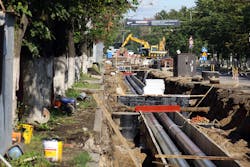In case you missed this month's lead story—or on the off-chance you’ve been hiding under a rock—Congress passed and the president has signed a $1.2 trillion infrastructure bill into law. As I wrote all the way back in April when the bill first seemed to have some momentum behind it, a trillion dollars is a difficult amount of money to wrap your head around.
It seems any time there is a federal project with some astronomical price tag there are a lot of people ready to say it’s just a bad idea. Some point to the huge amount of red ink the government is already awash in (the US national debt currently stands at just over $29 trillion). Some say that large projects like infrastructure are not something the feds are any good at (perhaps adding something wistful about the “good old days” and the Eisenhower Interstate Highway System).
As to that first point, a lot of the people who promoted and voted for the bill have stated that it is “paid for” (including Mitt Romney and Rob Portman, both Republican senators, and Krysten Sinema and Joe Manchin, both Democratic senators). By “paid for” they mean it won’t raise taxes, not that it won’t increase the debt. Scoring from the Committee For a Responsible Federal Budget indicates some of the money counted against the expense is from COVID relief programs that didn’t turn out as expensive as initially thought—which strikes me as creative accounting.
But to that second point, while the federal government will be administering the money, the actual spending of it is going to be done at the state and local level, and through a series of public-private partnerships. It’s not the Army Corp of Engineers that’s going to be replacing all those ancient lead water mains, it’s local contracting companies.
For those that need more convincing just look at the organizations that have come out in support of the bill: Associated Builders and Contractors (who, yes, voiced some concern about how contracts would be granted), the American Society of Civil Engineers, the International Association of Plumbing and Mechanical Officials, Plumbing Manufacturers International, the International Code Council and many more.
Yes, the price is high, but inaction has a price tag, too. According to the American Society of Civil Engineers 43% of our public roadways are in poor or mediocre condition. There is a water main break every two minutes in this country with an estimated six billion gallons of treated water lost each day. All three major components of the electric grid (generation, transmission, and distribution) have an investment gap.
And we all pay the price for that. In higher water bills, higher electricity bills, in higher prices for anything and everything that gets shipped on a truck. It acts like an invisible tax factored into our daily lives.
But, as I’ve said more than once in this space, when you’re talking about plumbing you’re talking about more than just money, you’re talking about people’s lives. The White House says lead pipes continue to serve an estimated 400,000 schools and childcare centers and between six million and ten million homes. Today, over half a million children in the United States have elevated levels of lead in their blood stream, based on CDC reports. And it's because most of the drinking water infrastructure in the US was built more than 50 years ago.
This re-investment in our country’s infrastructure is long past due. We gladly join with the organizations mentioned above in applauding the passage of the bill. The important work that needs to be done can’t start soon enough.
About the Author
Steve Spaulding
Editor-in-Chief - CONTRACTOR
Steve Spaulding is Editor-in-Chief for CONTRACTOR Magazine. He has been with the magazine since 1996, and has contributed to Radiant Living, NATE Magazine, and other Endeavor Media properties.
